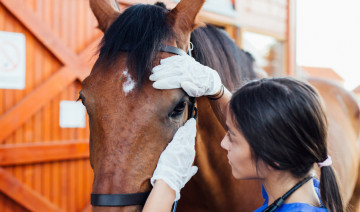With constant sneezing, itchiness, watery eyes, runny noses, and other symptoms, allergy season can be miserable. But what about horses with allergies? Our equine friends cannot visit the drugstore for an antihistamine, but there are steps you can take to relieve your horse’s discomfort during allergy season.
Allergic Reactions in Horses
Horses can have the same seasonal allergies as humans, and may be sensitive to dust, mold, pollen, or insect bites. Some horses may have only mild reactions that clear up quickly without any intervention, while other animals may have more severe reactions that require treatment. Just as humans may have different reactions to seasonal allergies, horses can also show a range of symptoms depending on the exact allergen, the type of exposure, and the animal’s overall health and sensitivity. Typical symptoms of seasonal allergies could include:
- Coughing or difficulty breathing
- Hives or raised rashes on the skin
- Runny nose
- Itchy or watery eyes
- Excessive dander or hair loss
When symptoms are severe, a horse may seem more lethargic or unwilling to train or work, or could lose its appetite because it is stressed or distracted by discomfort. It is important that the allergies be treated so there are no secondary complications, such as infected sores, loss of condition, or increased vulnerability to other diseases.
Treating Seasonal Allergies in Horses
Before beginning allergy treatment for a horse, it is important to get a confirmed diagnosis of the allergy. Different irritants such as a recent fly spray, change in shampoo chemicals, new blanket, vaccine reaction, or change in feed could create similar symptoms. A veterinarian will perform a physical exam or blood test to confirm a seasonal allergy, or may biopsy skin lesions if necessary. Once the allergy is determined, ways to relieve the symptoms include:
- Prescription antihistamines or corticosteroids, to be administered with veterinary supervision
- Using a medicated, itch-relieving mild shampoo or topical creams
- Cleaning the stable, barn, and stalls more frequently to remove excess dust
- Wetting the floor before sweeping to avoid stirring up more dust
- Feeding hay at ground level to promote natural nasal drainage
- Ensuring there is good indoor air circulation to avoid pollen or dust buildup
- Managing biting insects with appropriate sprays or fans
- Using a fly mask, full-body sheet, or fly boots to prevent bites
- Adding flaxseed or omega-3 supplements to feed for anti-inflammatory care
- Keeping the horse indoors on high pollen count days
The more steps you can take, the more relief you can provide your horse, no matter how severe its symptoms may be.
When to Seek Veterinary Care
Most seasonal allergies will resolve on their own as the seasonal conditions change, especially if you take simple steps to provide relief to your horse. If the symptoms do not resolve within a few days or they continue to worsen, however, it is best to seek appropriate veterinary care to be sure there are no more serious, underlying conditions affecting the horse. Provide your vet with as much information as possible for a thorough diagnosis and treatment plan, including when the symptoms first appeared, how they progressed, what steps you have taken to provide relief, and any other health conditions the animal may have that could have similar symptoms.
Seasonal allergies can be an annual occurrence for horses, or may only appear when conditions are particularly severe. A horse’s sensitivity to seasonal allergies will change throughout its life, and some horses may only have allergic symptoms once or twice. Being aware of the nature of seasonal allergies in horses, however, as well as how to provide relief, can help you keep your horse comfortable and at ease even when local allergens may be on the rise.






Comments